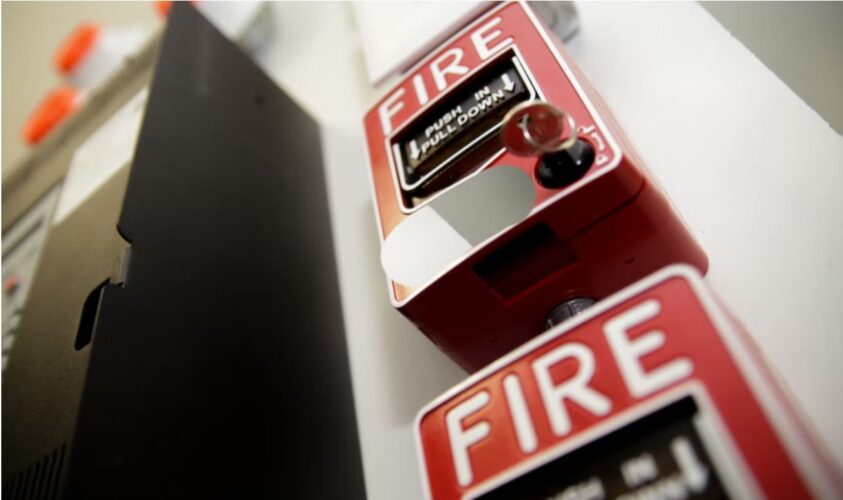While the Grenfell enquiry into the tragic tower fire is still yet to conclude, the lessons from it are taking effect. A new piece of legislation has changed the responsibilities of landlords for fire doors, particularly in tall buildings. The aim is to prevent another tragedy where fire compartmentation fails, and the usual ‘stay put’ advice for high rise fires is compromised – but also to protect tenants in all scenarios from poor fire safety maintenance.
The new fire door regulations for 2023 aren’t particularly complicated, but it does present some new challenges and responsibilities for landlords. Whether you’re a landlord looking to get your accommodation in shape, or a tenant interested in your rights under the new law, here’s everything you need to know about fire door safety in the UK.
What are the new fire door regulations?
The Fire Safety (England) Regulations 2022 came into effect at the start of 2023 following a Fire Safety Consultation, set up in response to the findings from the first part of the Grenfell enquiry. The first step outlined by the consultation was the enactment of the Fire Safety Act 2021, which clarified that the existing Fire Safety Order 2005 applied to all parts of a building structure, including the external walls and flat entrance doors.
The new fire door regulations for 2023 expand on this, establishing new rules on the provision and testing of fire doors in rented accommodation. The majority of the rules apply only to high rise buildings, now defined as those 11 metres or at least 7 storeys in height. There are also new rules on the provision of fire safety information to emergency personnel and to residents, as well as ensuring this information is kept up-to-date.
How do the new fire door regulations affect landlords?
The new regulations largely apply to the responsible person or persons for a given building. This is normally the building owner, but may also be a landlord or other individual/s in control of the premises. The headline change is that they must check all fire doors in common areas of the building (e.g. in the stairwells) on a quarterly basis.
Flat entry doors must also be checked on an annual basis. The self-closing devices on all doors must be shown to be working properly, and their condition checked so that they will perform as anticipated in the event of a fire. If access cannot be gained to a flat, the responsible person/s must provide evidence that an attempt was made to check the door. This government factsheet includes information on how to check the integrity of fire doors.
The responsible person/s must also provide all residents with information on fire doors, including the role they play in a fire, and why it’s important that they remain closed. Residents should also be empowered to report any damage to fire doors or other issues, with this being quickly followed up. This information should be given to residents when they move in, and then on an annual basis going forwards.
For buildings below 11 metres in height, the regulations also stipulate that all fire doors must be kept up to standard, and that residents must be kept informed about fire door safety. This is in addition to all existing fire safety legislation, including areas such as the fireproofing of walls and ceilings, as well as the avoidance of clutter that may impede safe egress.
How do the new fire door regulations affect tenants?
With the law now in effect, your landlord should already have been in touch regarding the new fire door requirements. A fire door should have been fitted if one was not already, and any existing doors should have been checked and replaced if necessary. This includes fire doors in low rise buildings, such as houses converted into multiple self-contained flats, or houses in multiple occupation (HMOs) with shared communal facilities.
If the requirements above have not been met, you should first contact your landlord, who will either be or be in contact with the responsible person for the building. If they are unwilling or unable to resolve the issue, you should issue a formal complaint to them before contacting your local council, who have the authority to step in on matters of health and safety. The Citizens Advice Bureau can advise you on following these procedures.
Tenants also have a responsibility to practice good fire safety under the new regulations. While landlords must provide fire doro safety information, you are also obliged to read and digest it. It’s important for your own safety and liabilities to understand how fire doors work, and why it’s important to keep them closed at all times, as well as how to spot a damaged or ineffective door. By doing this, you can help to keep yourself and your belongings safe.
The new fire door regulations in 2023 are the result of much soul-searching following the Grenfell Tower disaster, and a consideration of the many ways in which the fire safety of the building was compromised. Fire doors were a crucial part of that, and it’s contingent on both landlords and tenants to ensure that they are used and maintained properly in residential buildings, isolating fires and preventing them from spreading.

